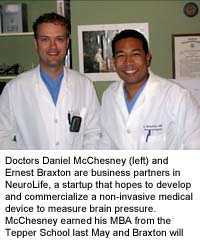Tepper School graduate Daniel McChesney (MBA’05) and Ernest Braxton (MBA’07) think they have a pretty good idea and several business experts agree.

The concept is for a startup that will produce a new hand-held, noninvasive medical device that measures brain pressure faster, safer and easier for more than 500,000 patients per year who suffer from brain injuries. The proposed diagnostic tool, which will measure brain pressure non-invasively through the patient’s eye, would also benefit more than 8.5 million American patients at risk of brain damage as a result of elevated brain pressure.
McChesney and Braxton know what they’re talking about as both men graduated from the University of Pittsburgh Medical School. McChesney is also a former researcher at the National Institutes of Health, and he’s also worked at multiple medical diagnostic start-up companies. Braxton was an emergency room physician at Osan Air Base in South Korea and is currently a neurosurgical resident at Allegheny General Hospital in Pittsburgh.
Business experts think it’s a good idea as well. NeuroLife, the company they founded to develop and commercialize the device, recently placed second among five finalists in FORTUNE Small Business magazine’s Student Showdown, a national business plan competition for B-school students. The company received $10,000 for its second-place finish from the competition’s sponsor SAP, a world-leading provider of business management software. McChesney and Braxton also won the Idea Foundry Business Plan Competition among Tepper School students earlier this year.
McChesney says the innovative tool will alleviate the risk of placing invasive monitors in the patient’s brain to measure brain pressure and provide early detection for patients suffering from brain disorders caused by stroke, hydrocephalus, meningitis and automobile accidents.
“We’re currently developing a prototype. The goal is to make it an automated, hand-held device that could fit into a compact bag,” says McChesney who earned his bachelor’s degree in biochemistry at Rutgers University in 1997.
NeuroLife is pursing funding from the National Institutes of Health, the Pittsburgh Life Sciences Greenhouse, private investors and the U.S. Army, which sees the device as a valuable tool for soldiers who sustain head injuries in the battlefield.
More than 80 teams from 66 business schools entered the FORTUNE competition.
Related Link:
The David A. Tepper School of Business



